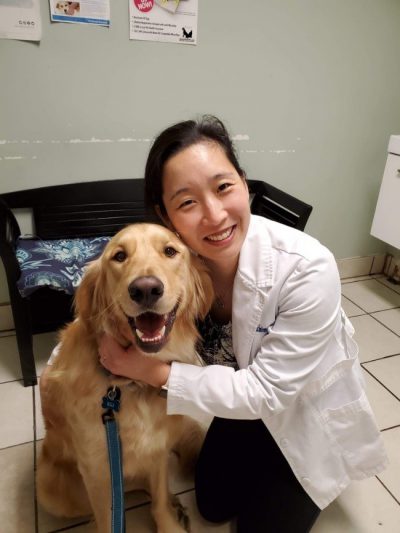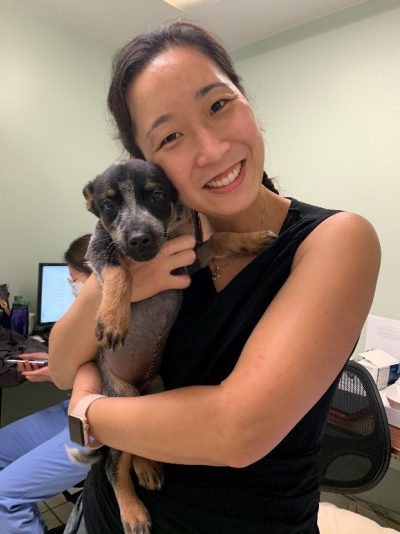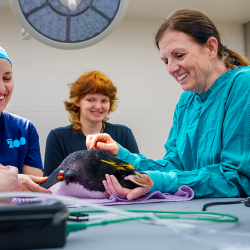Dr. Tracie Uchima earned her doctor of veterinary medicine degree from the College in 2009, and is currently practicing in the Los Angeles, CA area. Dr. Uchima is a mentor for the College's CVM Connect House Mentorship Program, which offers insight and advice to current veterinary students.
What is your current job, and what led you to your current career path?

I’m currently the owner of a private small animal general practice in Los Angeles, CA. I’ve been in and out of veterinary practices for over 20 years now, working as client service representative, veterinary assistant, or veterinarian in California, Hawaii, and Michigan. As for the life experiences and lessons learned along the way, I’m writing a book on it! Hopefully, it will help future medical practitioners shape their careers once I complete it.
What does it mean to you to mentor the next generation of veterinary professionals?
Teaching is always something that I have taken pride in, ever since I was in high school giving softball lessons or tutoring students in calculus, physics, and chemistry. Watching someone learn something you taught, and then having them apply it, has always been satisfying to me, no matter the subject. I’ve often thought about going back to school for my masters and PhD so that I could teach, but the commitment involved is more than I am willing to undertake at the moment. Being a mentor satisfies my desire to teach in the meantime.
What advice would you give to current veterinary students, or students interested in veterinary medicine as a career?
Know your ‘why.’ Why did you choose to be a veterinarian? Why veterinary medicine as a career? If you are confident in your answer, you know exactly why you decided to be on this path, then you will be fine for the rest of your life. Whenever you feel down, or particularly overwhelmed, revisiting your ‘why’ will get you through the toughest days. Let’s face it, veterinary medicine is hard, and it will challenge you. Knowing your goal, knowing what you want to accomplish, will give you the strength to push through the ‘bad’ days and get you to the better days ahead.
Share a story from your time in veterinary school or early-on in your career.
How about a funny one? During my internal medicine rotation, the attending resident and I were doing a client consult for a dog with chronic diarrhea. Giardia was one of the diseases on our rule out list. The attending resident asked the client, “Do you know what giardia is?” The owner responded quite in a matter of fact, “Yes. It’s a sexually transmitted disease.” The resident’s face started to turn red and she had to turn her face away as she was trying so hard not to break out laughing! I was left to explain to the client, “No, I think you’re thinking of gonorrhea. Giardia is a protozoa found in contaminated water that causes diarrhea.”
How has your MSU veterinary education shaped your life?

MSU has some of the best clinicians in the country. By paying attention to the various styles and approaches each one had to client interactions/communications, imprinted on my mind [were] the types of style and approach I would eventually adopt. I would take the things I liked, such as introducing myself as soon as I walk into a room, even if it's a client I’ve already met; going systematically from nose to tail when completing a physical exam; or sitting on the floor with the pet to make them more comfortable. Little things like these helped me create my own consultation style to fit my personality and goals of personal communication with my owners.
What was the most interesting class you took and why?
Equine Theriogenology. In undergrad, I assisted in research work on ewe reproductive endocrinology for four years. Equine therio was the only reproduction class offered at MSU at the time, so I went for it, as I wanted to see how far my repro knowledge base would take me
What’s something you learned in vet school that you still use today?
The most valuable thing I acquired from vet school are my classmates. They are a resource from vet school that I still use today. We all went on to do different things, specialize in different areas, and spread out across the country. I can ask them questions on cardio, ophthalmology, surgery, emergency and critical care, management, or even ask for referrals to a clinic when my client moves away. We spread out as far northwest to Alaska, southwest to Hawaii, northeast to New York, and southeast to Puerto Rico. We’ve pretty much got the map covered! Keep in touch with your classmates, they’ll be one of your best references in the future.
What are your hobbies or interests outside of veterinary medicine?
Softball, video games, golf, but mostly spending time with family. Softball is getting more difficult as my body ages, but it’s tough to give it up, as it’s been a part of my life for so long. Softball paid for my undergrad degree at the University of Hawaii at Manoa, so a lot of blood, sweat, and tears were invested into the game spanning decades.
What’s your favorite way to celebrate being a Spartan?
To wear it! I’ve got Sparty or CVM gear everywhere! Surgical cap, scrubs, coffee tumbler, cups, coasters, and even my PJ’s have the logo emblazoned on them. The other way I celebrate being a Spartan is by donating to the College every year since I graduated. I’ve been donating $100 every year. It’s not a lot, but I figure if each of the 100 of us that graduated donated that amount, the College would have $10,000 per year and that amount could be quite useful.



